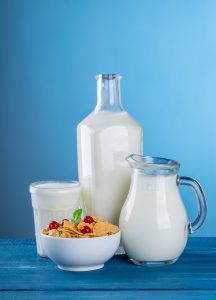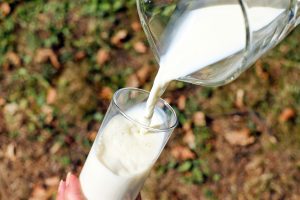
There are many benefits to drinking milk, including improved bone health, increased muscle mass, and a lower risk of obesity.
Nutrition Profile of Milk
Milk has a very good nutrient profile. One cup of milk contains 8 grams of protein, 8 grams of fat, and 12 grams of carbohydrates, making it a well-rounded source of nutrients. Vitamins A and D are also found in milk, along with calcium, potassium, and phosphorus.
Milk is an excellent source of calcium, which is essential for strong bones and teeth. It also contains vitamin D, which is necessary for absorption of calcium.
The high protein content in milk makes it an excellent choice for athletes or bodybuilders looking to build muscle. The fat content in milk can also help to keep you feeling full and satisfied after drinking it. Hence, it can aid in weight loss. The carbohydrates in milk provide energy and help to replenish glycogen stores after exercise.
Milk is also a good source of hydration, as it is about 87% water. This makes it a great choice for people who are looking to stay hydrated, especially during exercise or in hot weather.
Overall, milk is a nutrient-rich drink that can provide many benefits for your health.
Research on the Benefits of Milk
Some research has shown that drinking milk may also help to lower blood pressure and reduce the risk of heart disease. Milk contains a type of saturated fat that does not increase cholesterol levels in the blood. In fact, some studies have shown that drinking milk may actually help to lower cholesterol levels. Milk is also a good source of conjugated linoleic acid (CLA), which is a type of fat that has been shown to reduce the risk of cancer. CLA is found in milk fat, but not in the milk itself. Some experts believe that the CLA in milk may help to protect against breast cancer and colon cancer.
According to a new study, milk may have health benefits beyond just providing essential nutrients. The research, published in the American Journal of Clinical Nutrition, found that milk consumption was associated with a lower risk of death from cardiovascular disease and other causes. The study followed more than 130,000 adults in 21 countries for an average of 12 years. After controlling for factors such as age, sex, smoking, and physical activity, the researchers found that those who drank the most milk had a lower risk of death from cardiovascular disease, compared to those who drank the least.
Previous research has linked milk consumption to a lower risk of obesity, type 2 diabetes, and high blood pressure. Multiple studies suggest that milk definitely has some protective effect. The researchers say that the nutrients in milk, such as calcium, potassium, and vitamin D, may play a role in the health benefits.

How to Consume Milk
There are many different ways to consume milk, and each has its own benefits. Whole milk is the most natural form of milk, and contains all of the nutrients that are essential for human health. However, whole milk is also high in saturated fat and cholesterol, which can be detrimental to health for some people. Skim milk is a lower-fat alternative to whole milk, and can be a good choice for those who are looking to reduce their intake of saturated fat and cholesterol. Skim milk is also a good source of calcium, vitamin D, and other useful nutrients.
2% milk is another lower-fat alternative to whole milk, and contains slightly more fat than skim milk. 2% milk is a good source of calcium, vitamin D, and other vital nutrients.
Soy milk is a plant-based milk that is a good alternative for those who are lactose-intolerant or have allergies to milk proteins. Soy milk is also a good source of protein, calcium, and other essential nutrients.
Almond milk and rice milk are other plant-based milk that are good alternatives for lactose-intolerant people.
In addition to the many health benefits of drinking milk, it is also a delicious and convenient food. Milk is available in a variety of flavors, including chocolate, vanilla, and strawberry. It can be enjoyed cold or hot, and is a great addition to cereal, coffee, or tea.
Here is a good video on the benefits of milk